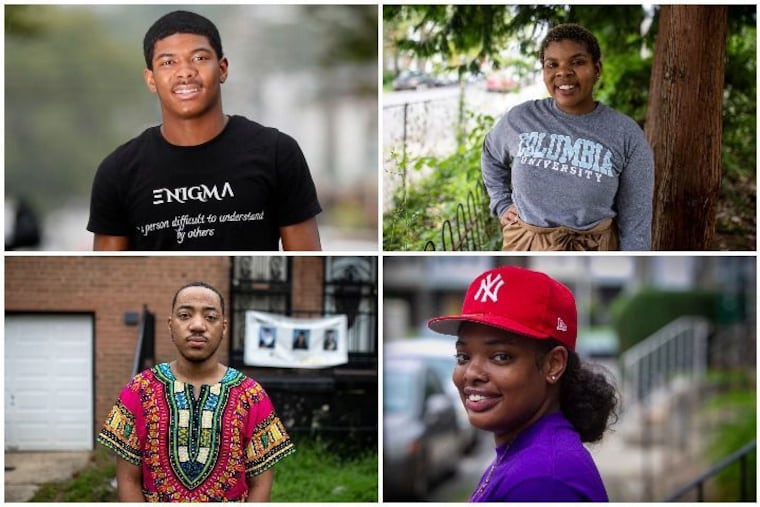For college students from Philly, closed campuses means they can’t escape the city’s gun violence | Helen Ubiñas
College students everywhere have had their school years disrupted because of the coronavirus. But for students in this city, the disruption can feel more like a trap.

Milaj Robinson should be in Atlanta right now, reveling in being far away from Philadelphia for the first time as he begins his freshman year at Morehouse College.
Chances are pretty good he would have run into Horace Ryans III on campus, also an incoming freshman.
Darrien Johnson planned to be in New York to begin her graduate work in nonprofit management at Columbia.
And Marayah Roher was headed back to Lincoln University in Chester County to continue studying the environmental justice she hopes to one day bring to Philly.
College students everywhere have had their school years disrupted because of the coronavirus. But for students in this city, the disruption can feel more like a trap.
Not going away to college also means not escaping the city’s relentless gun violence. It means being cheated out of a much-needed reprieve from the ever-present fear that this longtime epidemic will claim them or someone they love.
The pandemic robbed them of their chance to get out, even for a little while, to not have to look over their shoulder, to breathe.
“This was my opportunity to leave, to just be in a different environment and, I’m not going to lie, to get away from the gun violence,” said Robinson, who just turned 18.
In Southwest Philly, his Morehouse classmate Ryans, also 18, was taking in the news of the city’s surge of gun violence and feeling the same way. “I feel trapped. I was almost out.”
“This city has been my birthplace, the place that has shaped me into the leader and the young man that I am, but Aug. 9 would have been my day out,” said Ryans, who is majoring in education with a focus in African American studies. “I would have gotten out, grown into a different type of person and came back and did something different. So it feels debilitating and sad because sometimes I am scared to walk in my own city.”
That fear extends to parents who agonize over their children’s safety.
“Every time I go outside, my mom, she prays that I don’t get shot or killed, or oppressed or hurt by the police,” said Robinson, who plans to study political science.
Johnson’s mother would try to convince her and her siblings growing up in Strawberry Mansion that the sound of gunfire they heard was fireworks. But children in Philly learn the distinction early.
“She didn’t want to traumatize us,” Johnson, 22, recalled. “There weren’t many nights that I didn’t go to sleep to the sound of gunshots.”
The other night, Johnson’s mother called in tears after a shooting in the neighborhood left one teenager dead and four others wounded.
“My mother called me crying because she’s so anxious about the crime,” said Johnson. “It’s sick.”
This is the ongoing shame of our city: For too many Philadelphians, violence is the backdrop of their lives — even if it miraculously doesn’t directly affect them. If you’re lucky to be untouched, you almost certainly know others who weren’t.
Robinson was only 5 when he watched two men argue in front of his aunt’s house before one man shot the other in the head.
“That’s something I will remember the rest of my life,” he said.
This summer, a cookout he attended was interrupted by gunfire. No one was hurt, but at a pool party he went to last year, two young women were shot, one nearly fatally. That same year he went to back-to-back funerals for his cousin and a close friend, killed three days apart. His friend Eric Perry, 23, had just recently graduated from college. He was gunned down right outside his home.
A stark reminder that not even a college education is a shield against gun violence.
On the very day that a Northeast Washington teenager was supposed to be leaving for Temple University this month, the Washington Post reported, he died at a hospital after being shot a week before. Richard Bangura, 18, was shot less than two blocks from home, close enough for his father to hear the gunshots that killed his son.
At Lincoln University, where Roher, 20, is studying environmental science and biology, she said classmates from other cities share similar stories, and fears.
“It’s sad,” she said. “You shouldn’t have to run away from where you were raised just to get away from the violence.”
But here’s the thing: Even when they do, it’s often part of a larger plan to return in the hopes of making their city better.
“It was never a ‘I need to leave Philadelphia because I hate it here,’ ” said Johnson. “It was more like I know there are people out there who want to make a difference. It’s just getting those people in the right spaces … about becoming one of those people.”
For now, the students are trying to make the best of their new reality. Johnson and Robinson are growing nonprofit organizations to empower city youth. Remote classes, or a combination of remote and in-person instruction for Johnson, who will travel periodically to New York, have started. Earlier this month Robinson was front and center at a rally at City Hall against gun violence, urging leaders to do more to stop the violence.
Maybe next year they’ll have a chance to get away, step back, and breathe a little. They deserve at least that.